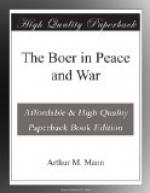The Boer makes an excellent pioneer, and when he found that the English ideas were not compatible with his own, he decided to move farther north. That is another of his characteristics—independence. He is not only independent to a degree, he is sensitive; and when he discovers by accident that he is a much-aggrieved party, his indignation does not usually take a violent form—he simply clears out. He may be somewhat different where the Transvaal is concerned—he may be indignant, but he has no intention in this instance of adopting the procedure of his forefathers. The latter had not yet dropped into an inheritance glittering with gold; they were merely agriculturists, and they desired pastures of their own. Some of them found desirable pastures in the barren wastes of the Free State, and subsequently the majority wended their way to the Transvaal.
It is not, of course, my intention to reiterate history. History is good enough when it is new, but I should only be covering ground which is already familiar to most readers. My purpose is to present glimpses of the Boer as he is to-day.
CHAPTER II
The Boers are very much like the Scotch—they are clannish. Every Boer has a solid belief in himself, to begin with, and every Boer has a profound belief in his brother. This characteristic has many advantages: it not only welds a people together, it is a sufficient guarantee of success in times of trouble and difficulty, and it has stood the Boer in good stead. He likes to tell you that no difficulty is insurmountable in his eyes—nay, further, he does not believe in the existence of any difficulty which he is not competent to overcome. Rumours of trouble with natives do not appal him, because he knows before he slings his gun over his shoulder that he is going forth to inflict due punishment upon the insurgents. He does not in any instance entertain the thought of a repulse. He marches to the front with a firm, determined step, and he does not rest until he has conclusively settled the matter.
The march to the front is a sort of family concern. I have tried occasionally to unravel the relations of the numerous families in certain districts, but it seems to me that the complications are too great to admit of analysis. For instance, it will be found that the family of Wessels is closely allied to the family of Odendaals, and the Odendaals, on the other hand, are related to the De Jagers. This kind of thing worries and tantalizes a man, and the only safe conclusion to arrive at is that the entire nation is linked together in some way or other by family ties. This may account for the fact that it is seldom necessary to introduce one Boer to another—they are very well acquainted without such formalities; if they are not, they very soon strike up an acquaintance.




